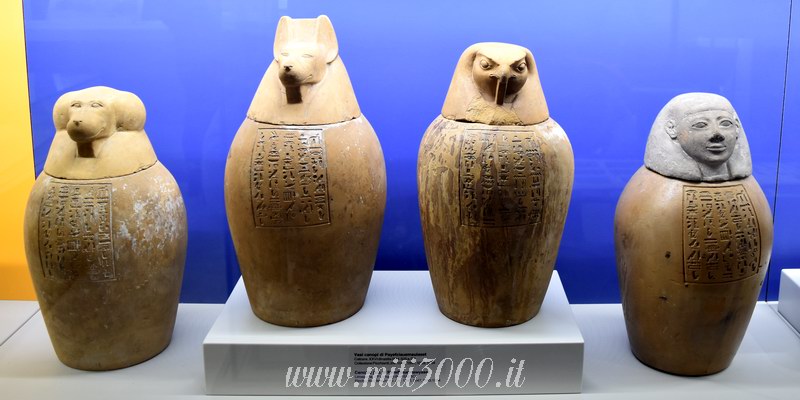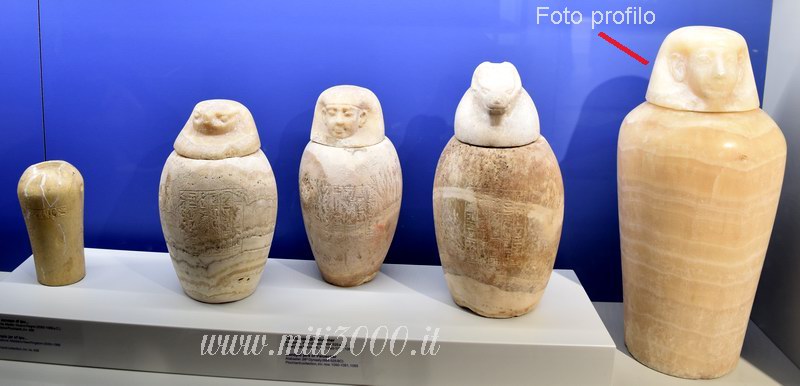Indice dei Musei
presenti in miti3000
Napoli Museo Nazionale - Piano -1 - Sala XXI La Mummificazione
- Intro sala XIX
- Sala XIX
- Intro sala XX
- Sala XX
- Intro sala XXI
- Sala XXI vetrina 49
- Sala XXI vetrina 50
- Sala XXI vetrina 51
- Sala XXI vetrina 52
- Sala XXI vetrina 53-54
- Sala XXI vetrine 55-56
- Sala XXI vetrine 57 - 58
- Sala XXI vetrine 60 - 61
- Sala XXI vetrine 62 - 63
- Intro Sala XXII
- Sala XXII vetrine 70 - 78
- Sala XXII vetrine 79 - 84
- Intro Sala XXIII
- Sala XXIII v.87-92
- Sala XXIII v.93-97
- Sala XXIII v.98-104
Testo
Sala XXI La Mummificazione vetrine 62 - 63
Vasi Canopi
Con il termine vasi canopi si indicano quei contenitori in cui venivano posti gli organi interni del defunto, estratti durante il processo di imbalsamazione e mummificati a parte. La parola “canopo” deriva dalla leggenda del marinaio greco Canopus che, morto e sepolto a Canopo, fu adorato in epoca greco-romana nella forma di un vaso con testa umana.
I coperchi dei canopi possono avere la forma della testa dei quattro figli di Horus: Amset, Duamutef, Hapi e Qebehsenuf, i quali, associati ai quattro punti cardinali e protetti rispettivamente dalle quattro dee Iside, Neit, Nefti e Selchis, proteggevano gli organi interni del defunto.
Canopic jars
The term “canopic jar” designates containers for the internal organs of the deceased, which were extracted during the embalming process and mummified separately. The word “canopic” derives from the legend of the Greek sailor Canopus, who died and was buried at the like-named locality, where he was worshiped in the Graeco-Roman period under the form of a human-headed vase.
The lids of canopic jars may portray the heads of the Four Sons of Horus - Amset, Duamutef, Hapi and Qebehsenuf, who are associated with the four cardinal points and protected by the four goddesses Isis, Neith, Nephthys, and Selkis, respectively. They protected the internal organs of the dead.
Vasi canopi di Payefciauemauiaset
Calcare. XXVI dinastia (664-525 a.C.)
Collezione Picchianti, inv. 1046, 1047, 1053, 1054
Canopic jars of Payeftjauemawyaset
Limestone. 26th Dynasty (664-525 BC)
Picchianti collection, inv. nos. 1046, 1047, 1053, 1054
Posiziona il mouse sulle immagini per avere più informazioni, Cliccaci sopra per l'ingrandimento.
Place the mouse on the images to get more information, click on it to enlarge.

Vetrina 63
Vaso canopo di Ipu...
Arenaria. Medio - Nuovo Regno (2055-1069 a.C.)
Collezione Picchianti, inv. 429
Canopic jar of Ipu...
Sandstone. Middle to New Kingdom (2055-1069 BC)
Picchianti collection, inv. no. 429
Vasi canopi di Paiuenher
Alabastro. XXVI dinastia (664-525 a.C.)
Collezione Picchianti, inv. 1050-1051, 1055
Canopic jars of Paiuenher
Alabaster. 26th Dynasty (664-525 BC)
Picchianti collection, inv. nos. 1050-1051, 1055
Vaso canopo anepigrafe
Alabastro. XXVI-XXX dinastia (664-332a.C.)
Collezione Picchianti, inv. 1049
Uninscribed canopic jar
Alabaster. 26th- 30th Dynasty (664-332 BC)
Picchianti collection, inv. no. 1049
Posiziona il mouse sulle immagini per avere più informazioni, Cliccaci sopra per l'ingrandimento.
Place the mouse on the images to get more information, click on it to enlarge.

Fotografie di Giorgio Manusakis
